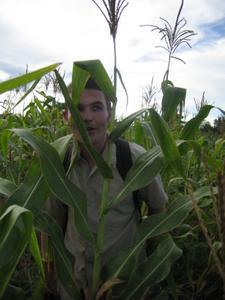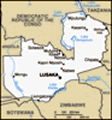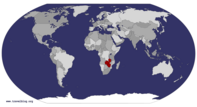Advertisement
Published: March 7th 2005

 Lost in Maize
Lost in Maize
It's scary learning how to farm!Mwabonwa Bwenzuma - ‘Greetings Friends’ in Tonga
It is update time again and I must say that I’ve really enjoyed my inaugural first Zambian weeks in Lusaka. It has offered me an initial comparative illustration between the very different lifestyles afforded by people in this humbly sprawling city. I saw and met people living what is termed here as “the high life”, afforded by a very small percentage of Zambian politicians, government officials and business people driving around in Mercedes Benz’s wearing Rolex watches. I lived and worked with many people in a still relatively small group who could be termed the middle class of whom I would say the majority of my NGO co-workers fit in. And I spoke with and spent a few days with people in the overwhelmingly large group of people who would be classified as living in poverty throughout the many compounds and slums located on the outskirts of the main city.
Development Point: Urban Migration A lot of my initial time here was spent in what would be called a middle class Zambian lifestyle. I was able to reinforce how people around the world can be so similar to me. Many of the Zambian friends
I made lived lives very similar to the one I lived back at home. They were attending or had just graduated from university and were looking for work. They lived in nice neighbourhoods in nice houses with TV’s, DVD players, big stereo systems, microwaves and the like. They spent a lot of their time hanging out with their friends, going to movies, chatting in bars, and playing football in the park (oddly enough no ice hockey though???…..but just give me time and I’ll see what I can do about that). I think that if I only lived in and experienced this specific aspect of Zambian life, I wouldn’t really think that things were very different. Sure, it was sometimes more difficult for some of these people to find a decent job, but that is a problem in many places around the world, not something that would define a country rated 164 out of 177 on the United Nations Human Development Index (Canada is currently rated 4th) . Living in the capital city, staying in a backpackers lodge and hanging out with other westerners and Zambian development workers was a great start for me, but I really felt this huge gut
feeling in my stomach that if I didn’t get out of the lifestyle I was in, I would easily grow accustomed and comfortable with it and stop pushing myself to break out of it. Spending a few days in the Lusaka compounds was really important for me because I was exposed one small piece of poor life here in Zambia, leaving me with many questions about figuring out what my role here is in piecing together the puzzle of poverty. It was time for me to get out to the rural areas to start seeing and experiencing for myself what life was like for most Zambians.
Over the past 2 weeks, I have shifted locations from the sprawling, 2-million inhabitant capital city, to the much smaller and quieter town of Mazabuka, just over an hour south of Lusaka. And reflecting now back over this time, it sometimes feels like I’ve completely moved to a different country. Mazabuka only really has two major streets, each with a couple banks, shopping markets and restaurants. It is quite well off compared to many other towns in Zambia because it is centred around a massive amount of sugar cane farms and the factory

 David's first farming experience
David's first farming experience
What isn't shown in the photo is the 9 days of a stiff back that came with the farmingthat produces most of Zambia’s sugar (one of the few industries in the country that is actually doing ok). It is also located in the southern province of Zambia and therefore the main language spoken by locals switches from Nyanja to Tonga. I was really excited to start learning Tonga because it is the language that is mainly spoken in Choma, the town I’ll be based out of. I’ll probably be spending much my initial time here studying Tonga so that I can properly communicate with the farmers that I’m going to be working with and as well earn the respect of the local community.
During my two weeks here, I have been training how to operate an IDE field office with two IDE staff members named Steve and Simon. Most of you know how much I appreciate working with great people, and I couldn’t have been luckier to have my initial field training with two guys who are as sincere, genuine, and passionately in love with the work that they do (for those of you who are familiar with my experience in India, you know how important this is for me).
Development Point: Motivations of NGO Workers We spent many of our days visiting various farmers, most of whom already own a treadle pump, sometimes traveling over 100km in between narrow dirt paths, through lush bush and getting stuck in deep mud sink holes. I initially had huge troubles trying to understand how some of these farmers that we were trying to reach could actually survive living so far away from any form of civilization. Zambia is a country of a very low population density so there are huge vast open spaces of land in between most of the farmers. This creates problems a lot of the time because even if the farmers are able to increase the amount of crops that they grow beyond a subsistence level, it is extremely difficult for them to transport their extra food from their farm to a market where they can sell it. Almost every farmer we met talked about the problems they faced due to not having proper roads or an affordable transportation means available for them take their food to market. Finding ways for these rural farmers to sell their produce is, and will be, one of the main challenges that I will face with my work here.
I have to admit, meeting some of these farmers and hearing some of their stories can be a bit depressing at times because it seems like they face so many challenges that I’m sure I will be writing about a lot during my time here. If you are interested, I’ve written up a little story about one of the farmers of whom I’ve met who has had success. It is my first attempt at a “Twambo Time” Hopefully it will give you a clearer picture of why I’m here because it sure did for me.
Twambo Time: David Muunga After spending time out with many of these farmers, I’ve realized one very important thing about myself. I KNOW VERY LITTLE ABOUT FARMING! Funny how a position helping to improve the lives of farmers would require knowledge of farming, isn’t it. So, after a huge internal panic attack viciously scrutinizing my own self worth, I have begun the process of learning how to farm. Yes, I know, snicker all you like about the image of city slicker David whacking himself in the leg with a hoe or choking on a piece of fertilizer because it looks like candy, but you just wait until I come back to Canada and I can school you in a game of name that African root vegetable! Hah!……(Is there such thing as a root vegetable?)
So, after having an amazing experience learning and training here in Mazabuka, I depart tomorrow to continue my training in the beautiful tourist capital of Zambia, the city of Livingstone. Livingstone is closely located to a number of wildlife safari game parks and more importantly, one of the world’s largest and most spectacular natural wonders, Victoria Falls! (If you can’t tell, I’m pretty exited). I will be there for another two weeks training, after which I will head back up to Lusaka for a few days of reporting and then finally back down to Choma, which will become my home for the remainder of my time here in Zambia.
Before I sign off, I have to explain something that could be very strongly affect my life in the months ahead. See, I was given very specific advice before I came to Zambia, that in February I really needed to make sure I had a super high-quality raincoat. This was because I would be arriving right in the middle of the Zambian rainy season, which meant I would be living in a torrential downpour of water everyday for at least two months. Unfortunately, It has already been 25 days since I arrived and guess how many time’s I’ve worn the jacket……..ONCE! I must admit, that way beyond the disappointment of not being able to show off my sleek new MEC raincoat, this lack of rain is starting to worry me a little. Although it is this rain that is supposed to be making my life miserable right now by creating almost impassible mud roads preventing me from getting to the farmers I am supposed to be visiting. It is this same rain that every single one of Zambia’s farmers is depending on right now to help create the food that is needed to feed this country. There is still time remaining for the rains to come and quench the thirst of these desperately dry crops, and it is in this time, that all of Zambia, including myself, place a huge amount of hope.
Thank you all for reading.
Kabuca uleta tunji - Tongan proverb
“Each new morning brings many new things”
Advertisement
Tot: 0.153s; Tpl: 0.011s; cc: 7; qc: 66; dbt: 0.0695s; 1; m:domysql w:travelblog (10.17.0.13); sld: 1;
; mem: 1.2mb








